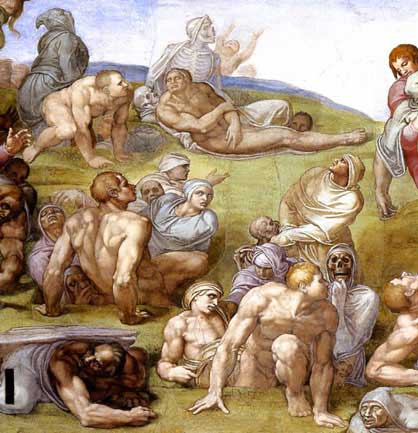 The witness of the Old Testament actually confirms the New Testament’s timing and characteristics of the rapture and of the Coming of Christ. Some people are surprised to learn that the concept of the resurrection and the gathering of believers to the Lord can be found in the ancient writings of the Old Testament. Long before the birth of Jesus, a few of the prophets saw the future rapture in such detail that they prophesied not only of the dead being raised and the believers being gathered, but they also foretold the wrath of God being poured out upon nonbelievers at the end of the age.
The witness of the Old Testament actually confirms the New Testament’s timing and characteristics of the rapture and of the Coming of Christ. Some people are surprised to learn that the concept of the resurrection and the gathering of believers to the Lord can be found in the ancient writings of the Old Testament. Long before the birth of Jesus, a few of the prophets saw the future rapture in such detail that they prophesied not only of the dead being raised and the believers being gathered, but they also foretold the wrath of God being poured out upon nonbelievers at the end of the age.
Thy Dead Shall Live
Isaiah was one such prophet, and he saw these events with such clarity that he even predicted them in proper chronological order, as compared to the Book of Revelation. This is how he wrote of that day:
“Thy dead men shall live, together with my dead body shall they arise. Awake and sing, ye that dwell in dust; for thy dew is like the dew of herbs, and the earth shall cast out the dead.
“Come, my people, enter thou into thy chambers, and shut thy doors about thee; hide thyself as it were for a little moment, until the indignation is past.
“For, behold, the Lord cometh out of his place to punish the inhabitants of the earth for their iniquity; the earth also shall disclose her blood, and shall no more cover her slain.”
Isa. 26:19-21
In some respects this passage is metaphoric, but for the most part it is straight forward and easy to understand, especially from what we have already learned about the Lord’s Return from other prophecies in previous sections. Isaiah simply says that someday he and everyone else will come forth out of their graves to live again. He says that even though every dead body now lives in dust, one day in the future the entire earth will literally cast out its dead. This is obviously a clear description of the resurrection—an event that we have already associated both with the rapture and the Second Coming.
But Isaiah also goes on from that point to describe the “hiding” of God’s people. He tells them to shut themselves in their “chambers” and hide themselves for just a moment until the “indignation” is past. What does he mean by this symbolism? The explanation can be found in the last verse. The indignation that Isaiah refers to is nothing less than the wrath of God with all its fury falling upon the evil people of the world. He predicts that the Lord will one day “come out of his place and punish the inhabitants of the earth”. What better description could Isaiah possible give of the coming judgment upon the wicked at the end of the age? And just like all of the New Testament references we have already studied, Isaiah also indicates that believers will be protected or “hidden” in that day…[read entire article]
Subscribe to End Times Truth
Subscribe to get notified when new articles or posts are uploaded. Always keep updated on the latest news in End Times prophecy!


